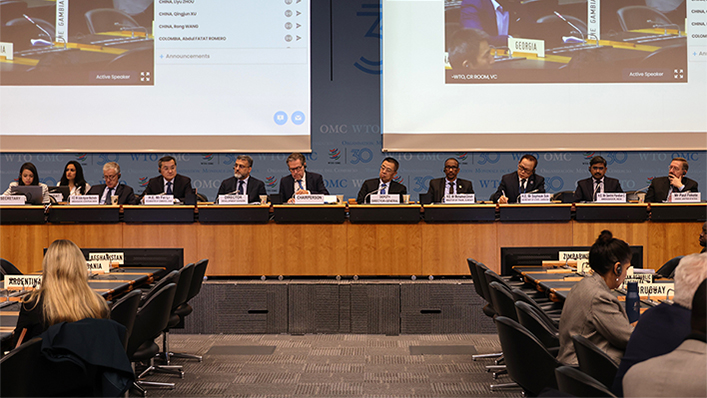
The event was opened by Mohamed Warsama Dirieh, Minister of Trade and Tourism of Djibouti, the coordinator of the WTO’s LDC Group. The other high-level speakers were Sok Sopheak, Cambodia’s Secretary of State of the Ministry of Commerce, Li Fei, China’s Vice-Minister of Commerce, Senthil Pandian C, India’s WTO Ambassador, João Aguiar Machado, WTO Ambassador to the European Union and Paul Fekete, senior representative from the United States Agency for International Development (USAID).
“We must intensify our efforts to foster an enabling environment for LDCs to harness their trade potential, take advantage of emerging trade opportunities and fully integrate into global markets,” said the chair of the Sub-Committee, Ambassador Ib Petersen of Denmark.
LDCs underscored how the WTO acts as an enabler of economic transformation. Preferential market access and flexibilities in WTO agreements and decisions help open up economic opportunities for LDCs, they stressed. “Let’s work together to ensure that trade continues to serve as a gateway to a more prosperous, sustainable and inclusive future for all,” said Minister Dirieh.
Non-tariff barriers, supply-side constraints, digital disparities across countries, climate change and graduation from the LDC category were cited as challenges that LDCs face. LDCs stressed the need for continued support in their efforts to diversify exports and enhance productive capacity.
The discussions highlighted the steps WTO members have taken to help LDCs become more active players in global trade. These include duty-free market access and targeted technical assistance.
China indicated that it has recently announced duty-free treatment for all goods and services from LDCs with whom it maintains diplomatic relations, and a three-year transition period for graduated LDCs. The meeting also featured examples of initiatives from key partners, including the European Union’s Global Gateway and the Team Europe Initiative on African Economic Integration towards the African Continental Free Trade Area (AfCFTA).
India indicated that over 250,000 professionals, mostly from LDCs, have benefited from the Indian Technical and Economic Cooperation programme. Several partnerships in tele-education and telemedicine have helped to improve access to education and healthcare services in LDCs, speakers emphasized. USAID drew attention to “Hello Tractor!”, the Alliance for eTrade Development and the “Feed the Future Innovation Labs”. These initiatives aim to support farmers and micro, small, and mid-size enterprises in LDCs in engaging in trade, including in agriculture and e-commerce, and to promote food security.
Members reaffirmed their continued commitment to addressing the challenges faced by LDCs, including in the LDCs Sub-Committee. They welcomed the recent progress, such as the WTO Ministerial Decision on LDC Graduation adopted at the 13th Ministerial Conference earlier this year. The important role the Aid for Trade Initiative and the Enhanced Integrated Framework (EIF) play in addressing LDCs’ capacity constraints was highlighted, with examples ranging from projects in Cambodia to The Gambia. Several graduating LDCs, including Bangladesh and Lao PDR, stressed the importance of advancing LDC graduation discussions in the Sub-Committee.
A video on LDCs and trade can be viewed here.
There are currently 45 LDCs, of which 37 are WTO members. Five are in the process of joining the WTO. These are: Ethiopia, São Tomé and Principe, Somalia, South Sudan, and Sudan.
More information on the Sub-Committee on LDCs can be found here.
Share
Reach us to explore global export and import deals